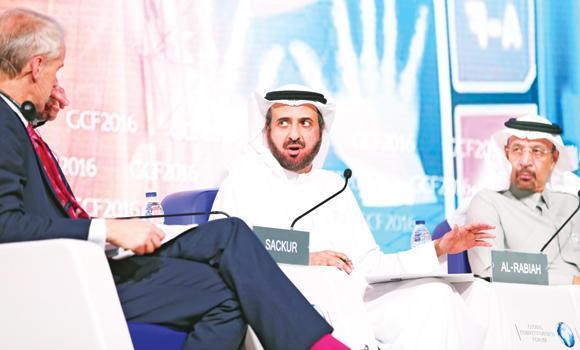
Saudi economy grows 5% despite oil price fall
The Kingdom’s drive to diversify its economy would offset the fall in oil prices, said Khalid Al-Falih, Saudi Aramco’s chairman, Monday.
Speaking during a panel discussion at the 9th Global Competitiveness Forum which started in Riyadh on Sunday, Al-Falih said: “Despite the fall in oil prices, the Kingdom’s economy has reported 5 percent growth and will continue to grow over the next 50 years.”
Al-Falih said the government has been working to diversify sources of income and the current trend is on innovation and creativity, and creating a knowledge-based economy.
He said the country has great investment opportunities in information technology, health care, tourism, financial services and telecommunications. In addition, the Kingdom plans to introduce new technology into its manufacturing sector, including training Saudis for highly specialized positions.
Al-Falih said that Aramco has reduced expenses, as was the case with other companies, because of the fall in crude prices. However, the company is to offer a basket of petroleum products to the market, and allow investors to take part ownership of Aramco. This would provide further income and boost business confidence, he said.
Saudi Aramco, which supplies all of Saudi Arabia’s crude oil, pumped more than 10 million barrels a day in each of the last 10 months as it sought to assert its role as the world’s lowest-cost producer.
The company pumped 10.25 million barrels a day in December, adding to a global supply glut that pushed benchmark Brent crude prices down 35 percent last year and a further 14 percent this month.
With regard to the provision of health care services, Al-Falih said the ministry is working to increase private sector participation, with plans to double this over the next five years.
The others who were in the panel included Commerce and Industry Minister Tawfiq Al-Rabiah, US Ambassador Joseph Westphal and Deborah L. Wince-Smith, president of the Council on Competitiveness.
Al-Rabiah said the government is working to streamline and facilitate private sector services and make use of modern technology in electronic trading. It is also encouraging corporate mergers and acquisitions to make the Kingdom more competitive.
He said some companies that do not have operations here have misconceptions about investing in the Kingdom. The ministry was working to clarify the situation. The promising sectors in the country included telecommunications, information technology and financial services, he said.
Wince-Smith said that Saudi Arabia has a great deal of potential, which should be harnessed for the benefit of the country’s people.


























